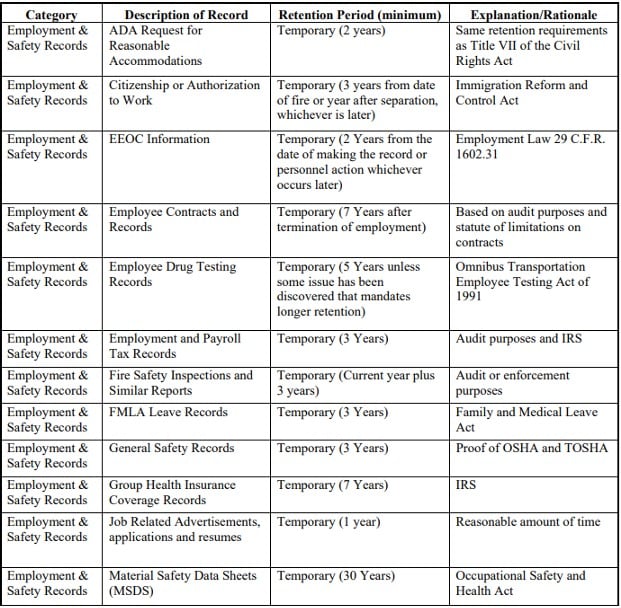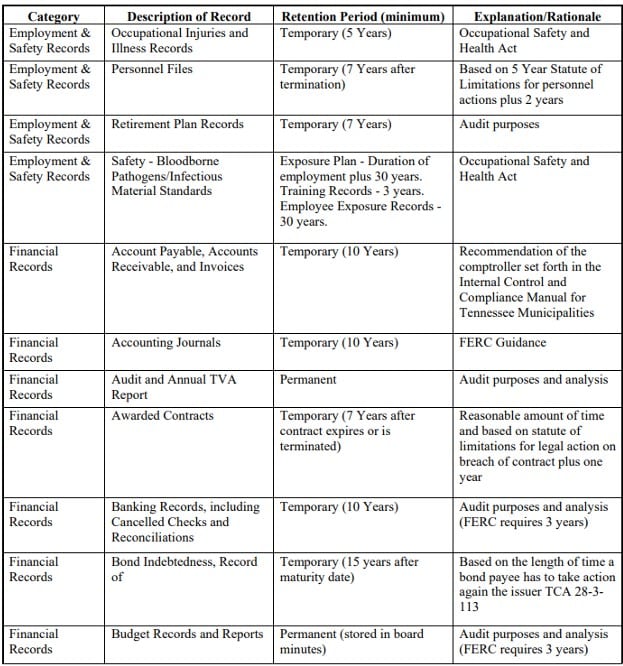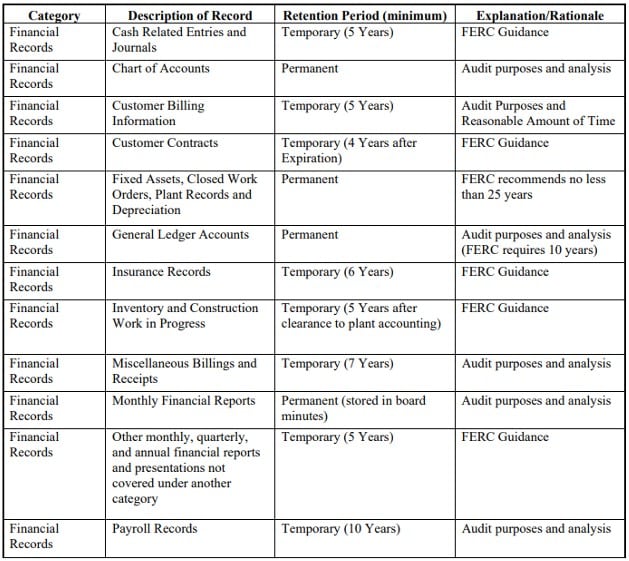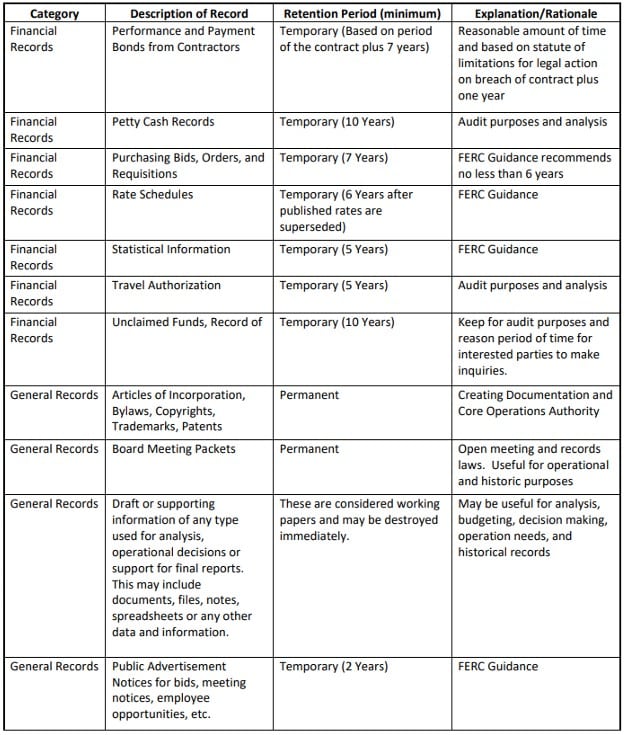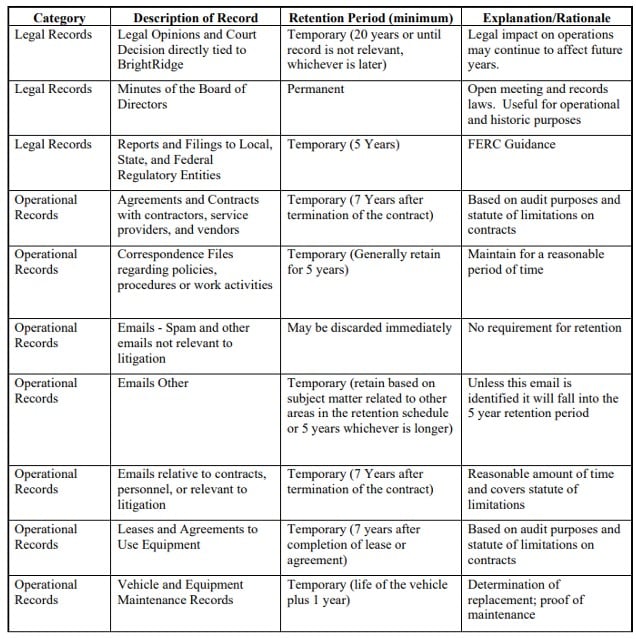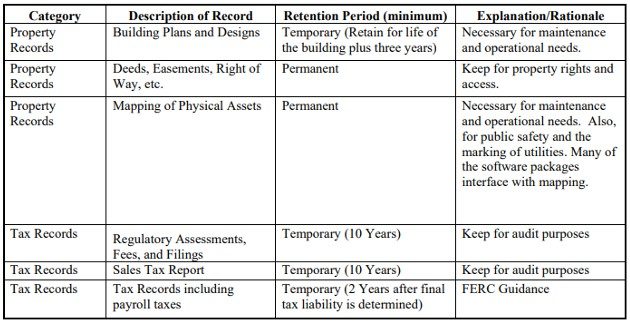BrightRidge Records Retention Policy
Effective March 26, 2019
Purpose
This Policy provides the guidelines for retention and disposal of records.
Definitions
• Records – Records shall mean all documents, papers, letters, maps, books, photographs, microfilms, electronic data processing files and output, films, sound records, or other material, regardless of physical form or characteristics made or received pursuant to law or ordinance or in connection with the transaction of official business by BrightRidge.
• Permanent Records – Those records which have a permanent administrative, fiscal, historical, or legal value.
• Temporary Records – Those records which can be disposed of in a short period of time (most often less than seven years) as being without value in documenting activities or transactions. There may be temporary records that have longer periods for some specific reason.
• Work Papers – Those records created to serve as input for final reporting documents, including electronic data processing records, and those records which become obsolete immediately after agency use or publication.
• Records Retention Schedule – This is a guide for the management of records and how long they should be kept. Also, the records retention schedule serves as the ongoing authorization for the dispositions of records.
Reasons for Record Retention
Records are a necessary part of the management and operations of BrightRidge. Effective record keeping can provide better efficiency by reducing the time to find and locate information. Records that are paper related often take up large amounts of space. This space and the amount of records can slow down the process to retrieve documents. While Electronic records do not require much physical space, they may require servers and data storage drives. Often records must be purged from enterprise system to improve the operational efficiency of the software. The more records in the data tables the more data that a system must go through on inquires and report generation. The access and storage of some records are required by law or regulation. Audits often require detailed records to complete.
Public Records
Open records laws make public records available for inspection, absent a specific law or legal order to the contrary. Public Records request are covered under a separate Public Records Policy and information about making a request is located at www.brightridge.com.
Confidentiality and Protection of Personal Information
BrightRidge recognizes the importance of protecting personally identifiable information of its customers and employees. There are multiple laws relating the protection of personal information such as a person’s social security number or bank account number. BrightRidge has multiple policies related to the protection of information such as the Red Flags Policy, Broadband Privacy Notice and Policy, and Customer Proprietary Network Information (CPNI) Policy.
Permanent Records
Permanent records are of such value that they must always be retained in some kind of permanent format. Permanent records may identify ownership or some obligation. Also, they may have some legal significance in perpetuity. Some records may be categorized as permanent due to the historical value. Information that may be helpful for statistical information or planning purposes could be designated as permanent. Some records may be permanent based on some regulatory directive or law.
This policy allows permanent records to be reproduced by other viable methods and therefore allow the original document to be destructed. This could include photocopies, film, scanned images, audio records, and any other electronic methods.
Work Papers
Work papers is a class of records that comprises all the records that may be considered small, informal, insignificant or not valuable. Rough drafts of reports, notes, calculations, etc., are examples of items that could be categorized as a work paper. Work papers may be destroyed immediately without retaining the originals of the records. A large portion of daily work by many departments would be categorized as work papers.
Temporary Records
Any record that must be kept for some use after its initial use may be a temporary record. Any record which can be disposed of in a short period of time as being without value in documenting the functions of BrightRidge. Payroll records are good examples. Many payroll records have fulfilled their primary purpose once an employee is paid but those records must be kept in order to comply with audits and governmental regulation and statues. While these records are important, they are not required for permanent storage. Some temporary records could have a longer retention period. Some temporary records may be transferred to a format that is much easier to search and/or store.
Records Storage
BrightRidge records come in a variety of formats. There is onsite storage, offsite storage, electronic storage, and multiple forms of redundant storage. The preferred method of storage will be electronically when practical. Electronic records are easier to manage, retrieve and are generally protected by a redundant backup system. Records may be converted to an electronic format unless it is a record that is required to be in a physical format.
Retention Schedule
A retention schedule provides the direction on what to do with permanent and temporary records by class of record and in some cases by specific record. The retention period is considered the minimum period of retention and records may be retained longer than this period. If a record does not fit within a classification on the retention schedule, the CEO or the BrightRidge Officer whose department is responsible for the record may assign the record to the appropriate classification.
